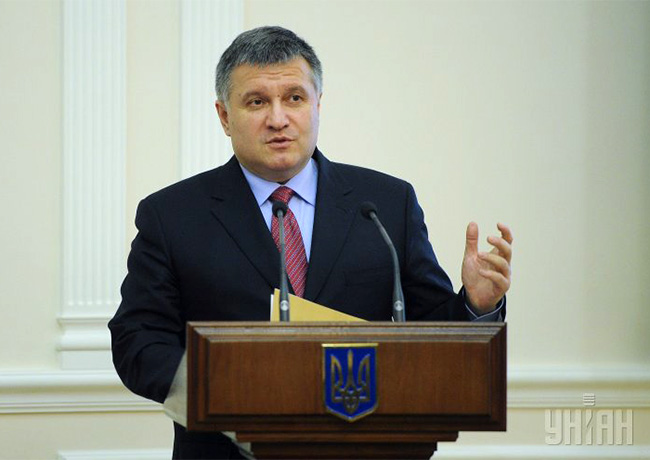Despite Avakov’s opinion, maybe 70% of the criminal cases destroyed in the parliamentary elections ended in nothing
Based on the parliamentary campaign of 2012, the subsequent elections of people’s deputies of Ukraine demonstrated the government’s commitment to ensuring proper standards in the election process. Having radically changed the flow of administrative resources to the election campaign, the systemic transfer of township powers to the process of willed citizens was not recorded.
The emphasis on competitiveness in the election process was a legacy of changes in the power vertical, the concentration of the political elite to demonstrate the ability of the state to hold elections in democratic ambushes. It’s too early to talk about democracy’s victory.
The political context of the election process may change, the importance of politicians in fair elections may increase or become known, and, in the election, legislation in Ukraine is constantly being revised. Without fair punishment of those guilty of crimes against the electoral rights of citizens, the independence of law enforcement agencies from the electoral rights will ensure the burden of democratic standards on the election process in Ukraine.
Unfortunately, throughout the entire history of elections in independent Ukraine, the legislator, reacting to the disruptions, has chosen to gradually complicate election procedures. Our candidates successfully came up with schemes to bypass the new barriers that changed the reform of election legislation into a closed circle.
Before the next elections to the Supreme Council of Ukraine, the Minister of Internal Affairs of Ukraine Arsen Avakov stated that there will be a first election process if the guilty will be punished “harshly and beautifully.” This month has already passed since the voting day and it is time to learn about the effectiveness of beautiful and harsh punishment for crimes against the electoral rights of citizens.
Gromadianska merezha OPORA in the middle of Bereznya 2015 I contacted the Main Investigative Directorate of the Ministry of Internal Affairs of Ukraine asking about the results of criminal investigations revealed in the current elections of people’s deputies of Ukraine. For “cross-control”, similar requests were sent to the regional departments of the Ministry of Internal Affairs of Ukraine. Interim results of the investigation of crimes against the electoral rights of citizens indicate that out of the hundreds of criminal cases discovered in 2014, only one has reached trial.
According to the data of the Head Investigation Department, the camp will be in mid-Berezny 2014. at the hour of the second elections of people’s deputies of Ukraine, 4069 applications and notifications were submitted to a single form of applications and notifications about the commission of crimes and other causes, directly and indirectly associated with through a selective process, for which 451 criminal offenses were discovered.
Considering Articles 157, 158, 158-1, 158-2, 159-1, 160 of the Criminal Code of Ukraine, which directly oppose the election rights of citizens and do not include rioters, hooligans or In other cases, during the elections, 291 criminal activities were discovered.
Table 1. Distribution of criminal offenses in the elections to the Verkhovna Rada of Ukraine according to the articles of the Criminal Code of Ukraine (according to the data of the Main Investigation Department of the Ministry of Internal Affairs, February 2015)
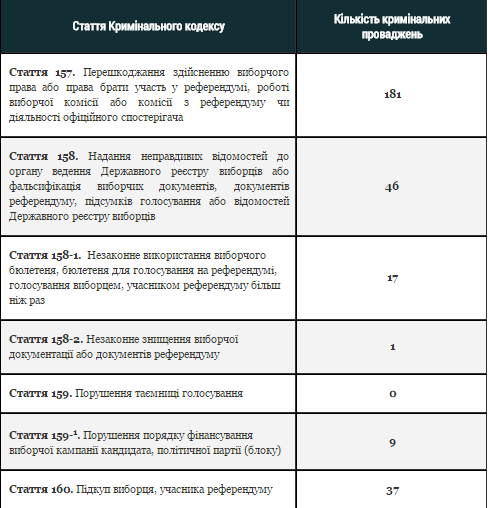
The greatest number of criminal offenses was found under Article 157 of the Criminal Code – 181. This article of the Criminal Code of Ukraine covers the episodes of the free citizen’s overhaul of his election law, overhaul the activities of another subject of the election process, a member of the election commission, when they vacate their positions, are subject to deception or concealment, as well as the deception of a member of the election commission in work commissions without important reasons. This article also includes the issue of handing over the service individual from the vacancies of the service position to the current election commission of them again.
Another place for a number of criminal offenses is occupied by Article 158 of the Code of Ukraine (46), which includes the submission of false information to the State Register of Elections or falsification of election documents. voting bags and records of the State Register of Elections. The third place is occupied by cases of bribery of voters (Article 160 of the Criminal Code of Ukraine) – 37 cases.
Significantly fewer criminal offenses were discovered under Article 158-1 of the Code of Ukraine (illegal disqualification of an election ballot, a ballot for voting in a referendum, voting by an elector more than once), Article 159-1 (violation of the order financing the election campaign of a candidate, political party), Article 158-2 (illegal reduction of election documentation or referendum documents). Varto notes that under Article 159 of the Criminal Code (destroying the voting chamber), no criminal activity was violated.
As evidenced by the data of the Main Investigation Department of the Ministry of Internal Affairs of Ukraine, only 4.5% of criminal activities in their criminal cases reached their effective completion (data that were found in the regions management).
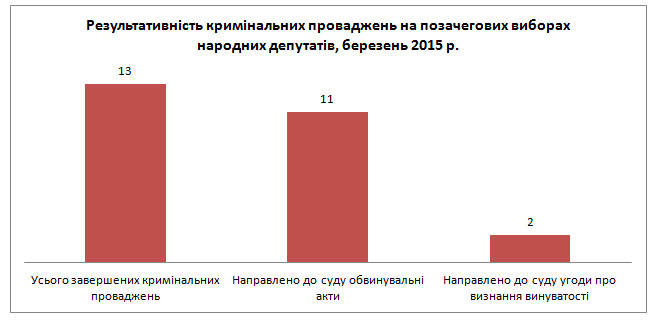
Of the 13 successfully completed criminal cases, in 11 cases the indictments were sent to the court, in two cases the charges were sent to the court due to the recognition of guilt placed between the accused and the prosecutor’s office. The difference between the indictment lies in the fact that it remains to avenge the punishment of the accused for his or her punishment and exoneration from his trial.
The indictments sent before trial were most often charged with criminal charges under Article 158-1 (Illegal selection of the election ballot more than once), less often under Article 157 of the Criminal Code of Ukraine (Change of the current electoral law to the robotic election commission or the referendum commission and the activities of the official guard). In this case, 2 of 11 indictments were based on Article 160 of the Criminal Code of Ukraine regarding the bribery of elections.
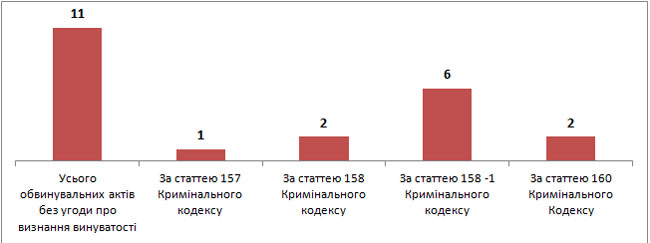
In fact, one of two reasons for the recognition of guilt was a criminal offense under Article 157 of the Criminal Code of Ukraine (Redesign of the current election law or the right to take part in a referendum, a robotic election commission and the activities of the official sponsor), otherwise – Article 158-1 (Illegally altering the election ballot, voting by an election participant, a referendum participant more than once).
Camp on Berezen 2015 Internal law enforcement agencies closed 202 out of 291 criminal cases (69% of the total number of closed cases). The investigation of up to 75 (25% of the total) criminal activities is still alarming.
Thus, perhaps 70% of the criminal cases raised in the previous parliamentary elections ended in nothing.
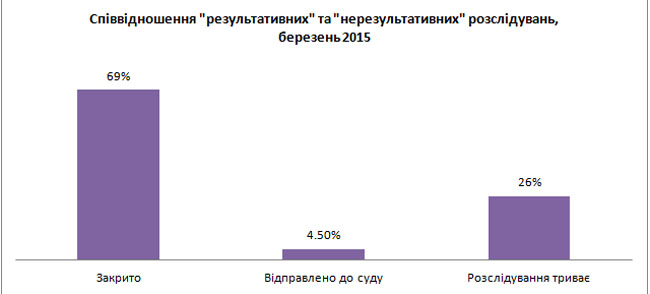
At the same time, according to the data of the regional departments of the Ministry of Internal Affairs of Ukraine, investigations are carried out on up to 59 certificates. The most current criminal issues are reported to the internal affairs bodies of Donetsk (33) and Kiev regions (12).
13 regions of Ukraine (Zaporizka, Zhytomyrska, Khersonska, Ternopilska, Poltavska, Zakarpattska, Khmelnytska, Volinska, Lvivska, Chernivetska, Ivano-Frankivska, Dnipropetrovsk region) no longer have Of course, the investigation of these is troubling. In this case, in 13 regions, 9 certificates were sent to the court at once.
In other areas, the number of both unfinished proceedings and completed submissions of materials before the trial appears to be isolated episodes.
The statistics for the Kirovograd region are sufficiently clear; single-mandate constituencies featured in many political statements after voting day. Zokrema, mova about the revelation of facts, which, undoubtedly, testified about the use of technology to bribe voters in the interests of Oles Dovgy.
The internal affairs bodies of the Kirovograd region discovered 12 criminal cases, 11 of which were closed, and the investigation of only one crime is still in progress. Political resonance without effective investigation, apparently, is worthless.
The effectiveness of the investigation into crimes against the electoral rights of citizens, which took place in the 2014 parliamentary elections, is closely related to the intensity of the upcoming local elections. Although those who are guilty of bribery of voters, falsification of election documentation, and other crimes will not be punished in 2014, this means that candidates in local elections use victorious methods.
And, most likely, no matter how much violation of the law there will be, the fragments of respect will not be able to preserve the diversity of election campaigns in local elections. The responsibility of law enforcement agencies to bring to a logical conclusion the investigation of election malpractices is a dead test for the government. And in whose food there can be no formalism: some certificates are opened, some certificates are closed.
The promise is to ensure that the state objectively and fairly punished the guilty and did everything possible to avoid similar evils in the future. Moreover, during the election process, senior officials of the security agencies publicly committed to demonstrate new approaches to work, “harsh” and “beautiful” punishment of the guilty. The hour for calling has already arrived.
Oleksandr Klyuzhev, analyst of the Gromadyansky Measurement OPORA

